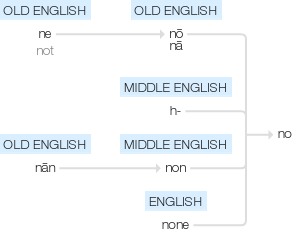No
Old English nō, nā (adverb), from ne ‘not’ + ō, ā ‘ever’. The determiner arose in Middle English (originally before words beginning with any consonant except h- ), reduced from non, from Old English nān (see none1).
wiktionary
From Middle English no, noo, na, a reduced form of none, noon, nan(“none, not any”) used before consonants (compare a to an), from Old English nān(“none, not any”), from Proto-West Germanic *nain, from Proto-Germanic *nainaz(“not any”, literally “not one”), equivalent to ne(“not”) + a. Cognate with Scots nae(“no, not any, none”), Old Frisian nān, nēn("no, not any, none"), Saterland Frisian naan, neen(“no, not any, none”), North Frisian nian(“no, not any, none”), Old Dutch nēn("no, not any, none"; > Dutch neen(“no”)), Old Norse neinn(“no, not any, none”). Compare also Old Saxon nigēn("not any"; > Low German nen), Old Dutch nehēn (Middle Dutch negheen/ negeen, Dutch geen), West Frisian gjin, Old High German nihein (> German kein). More at no, one.
From Middle English no, na, from Old English nā, nō(“no, not, not ever, never”), from Proto-Germanic *nai(“never”), *nē(“not”), from Proto-Indo-European *ne, *nē, *nēy(negative particle), equivalent to Old English ne(“not”) + ā, ō(“ever, always”). Cognate with Scots na(“no”), Saterland Frisian noa(“no”), West Frisian né(“no”), West Frisian nea(“never”), Dutch nee(“no”), Low German nee(“no”), German nie(“never”), dialectal German nö(“no”), Danish nej(“no”), Swedish nej(“no”), Icelandic nei(“no”). More at nay.
Variant of No., from the scribal abbreviation for Latin numero(“ in number, to the number of”).
etymonline
no (adv.)
"not in any degree, not at all," Middle English, from Old English na, from ne "not, no" + a "ever." The first element is from Proto-Germanic *ne (source also of Old Norse, Old Frisian, Old High German ne, Gothic ni "not"), from PIE root *ne- "not." Second element is from Proto-Germanic *aiwi-, extended form of PIE root *aiw- "vital force, life, long life, eternity." Ultimately identical to nay, and the differences of use are accidental.
As an adjective, "not any, not one, none" (c. 1200) it is reduced from Old English nan (see none), the final -n omitted first before consonants and then altogether. As an interjection making a negative reply to a statement or question, "not so," early 13c., from the adverb. As a noun, 1580s as "a denial; a negative vote," 1650s as "person who casts a negative vote."
Construction no X, no Y is attested from 1530s (in no peny no pardon). No problem as an interjection of assurance is attested by 1963. No way as a colloquial expression meaning "it can't be done" is attested by 1968 (noway (adv.) "not at all, in no respect, by no means" is from c. 1300). No-knock (adj.) in reference to police raids without permission or warning is by 1970, American English. Phrase no can do "it is not possible" is attested from 1827, a locution of English-speaking Chinese noted 19c. in China, Australia, and the West Coast of the United States.
We repeated our advice again and again, but got no answer but a loud horse-laugh, and their national maxim of No can do: Europe fashion no do in China. ["Reminiscences of a Voyage to and from China," in Paxton's Horticultural Register, London, 1836]
